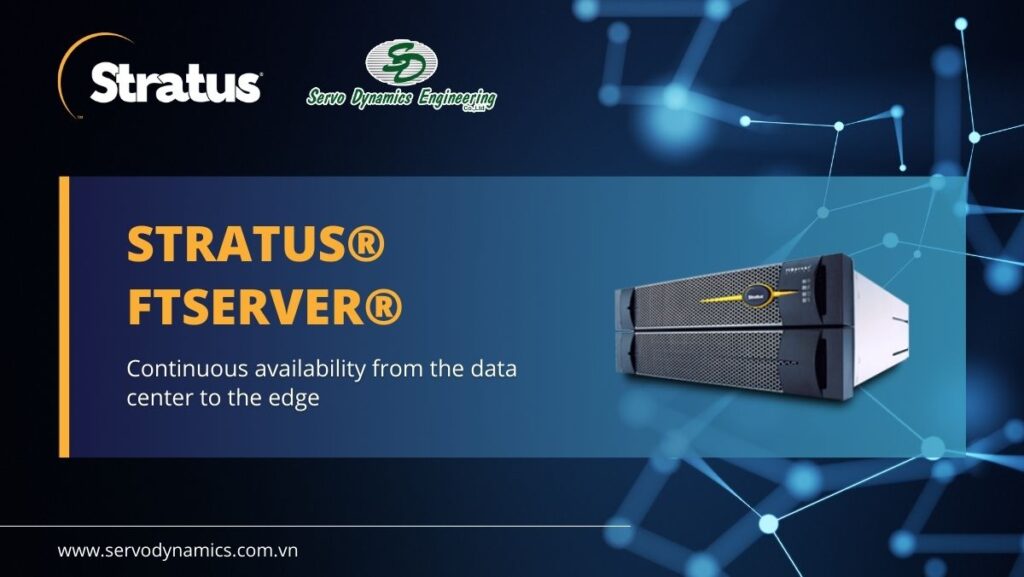Stratus Technologies, Consulting, Industrial Automation, News
Stratus ftServer: Features, Benefits, Models, and Applications
In today’s fast-paced business world, ensuring the continuous availability of critical applications and data integrity is essential, as recovery from failure is often not an option. With businesses increasingly relying on distributed systems in remote or edge locations, fault-tolerant solutions are more important than ever.
Stratus ftServer offers continuous performance with minimal IT support for both data centers and remote environments, helping businesses maintain operations without downtime. This article highlights how it delivers unmatched reliability and performance for today’s demands.
What is Stratus ftServer?
Stratus ftServer Overview Video
Stratus ftServer is a fault tolerant computing platform designed to run mission-critical applications at the data center, control room, or edge locations without downtime or data loss. The platform’s hardware-based, fully-redundant architecture delivers better than five-nines reliability, is easily serviceable by OT or IT, and is uniquely engineered for proactive health monitoring and self-healing. Using ftServer, organizations are able to rapidly modernize their IT infrastructure to maximize reliability, simplify manageability, and increase efficiency with minimal risk.
In addition, application virtualization enables the consolidation of multiple software workloads onto a single ftServer platform to run a data center, digital factory, or remote asset. This unmatched combination of performance, computing power, reliability, and serviceability allows organizations to build future-proof, edge-to-enterprise architectures necessary to connect edge operations with cloud investments and realize edge-core-cloud data strategies that turn data into actionable insight.
• >99.999% application availability via hardware-based fault tolerance
• Serviceable by OT and IT
• Proactive health monitoring

How Stratus ftServer works
How It Works – Stratus Platforms Engineered for Unmatched Reliability

1. Fully redundant hardware
How
- Dual customer replaceable units (CRUs) built with industry-standard components
- Each CRU includes its own CPU, memory, storage, and power
- Redundant component leverages multi-path IO for availability
- Stratus hardened drivers key for I/O and storage redundancy
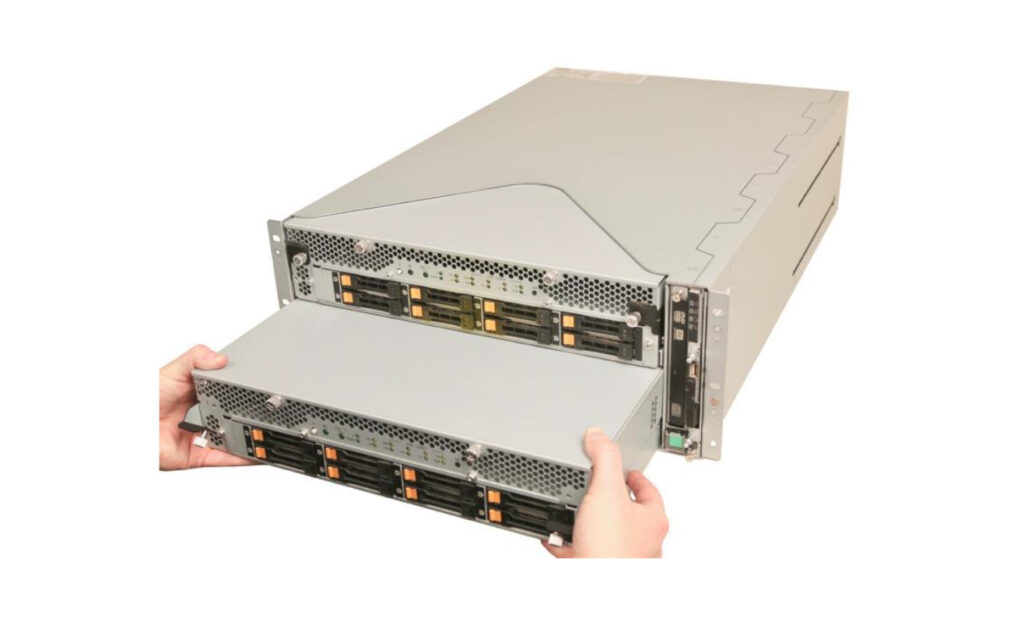
Benefit
- Individual CRUs are hot swappable by OT or IT users
- Does not require specialized tools
- Platform automatically synchronizes replacement CRU (re-duplex)
2. Patented “lockstep” processing
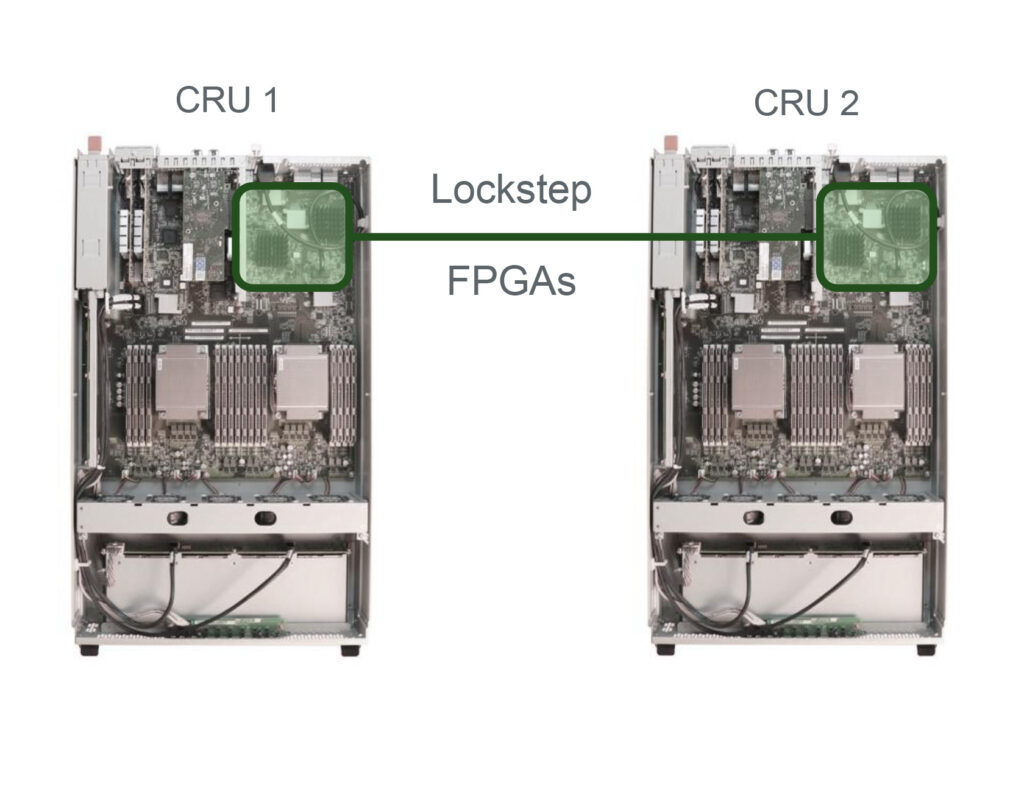
How
- Stratus FPGAs and firmware synchronize CPUs between CRUs
- Stratus’ patented hardware-based fault tolerance leverages Intel “lockstep” processing
- Both CPUs process the same data as a single image (duplex mode)
Benefit
- Hardware-based fault tolerance eliminates failover time
- No in-flight data loss or pause in transaction processing
- Does not require software modification or failover scripts
3. Stratus Automated Uptime Layer (AUL)

How
- Stratus Automated Uptime Layer software sits across CRUs
- Manages data synchronization and replication across CRUs
- Monitors 500 points of platform health and component performance
Benefits
- Provides platform self-diagnosis, self-healing, and pro-active health monitoring including alerting
- Platform health alerts are sent via the Stratus ActiveService™ Network (ASN) or through standard protocols such as SNMP traps or OPC UA
Proactive Health Monitoring Substantially Simplifies Manageability

How
- Self-monitoring hardware continually checks key parameters of 500 potential alarm points
- Self-diagnosing system continually evaluates its health
- Self-healing platform automatically takes subsystems offline and attempts to resolve issue [Identify > Isolate > Service]
- Automated alerts keep users informed of platform status
- If component failure is diagnosed, platform automatically orders replacement part, arrives next business day
Benefits
- ftServer alerts users of issues before they occur
- Delivers platform expertise to free up IT teams and to support OT teams
- Provides full service and support to deliver complete availability solution
Simplify IT Infrastructure with Workload Consolidation
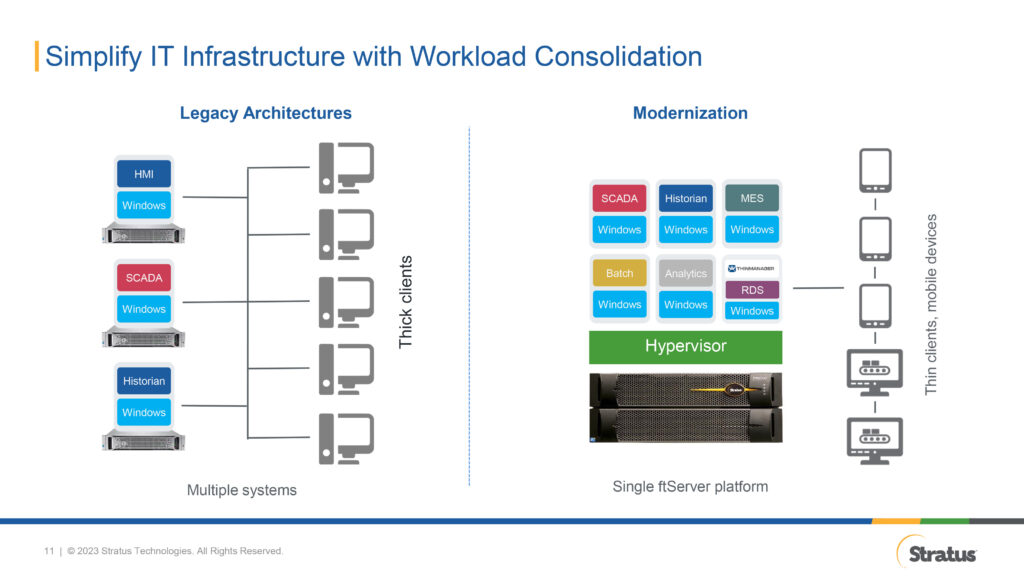
Stratus ftServer Models and Specifications
ftServer is easy to deploy, easy to manage, and easy to service. Four different ftServer models meet most every enterprise workload, environment, and budget.
Affordability for stable, fixed standalone applications in remote offices, branch offices, or shop floor locations
Versatility for rapidly growing or evolving applications in regional offices, remote plants, or regional data centers
High performance for data- or transaction-intensive applications in large remote plants or corporate data centers
The ultimate in performance for computer, data or transaction intensive applications in corporate data centers or large plants


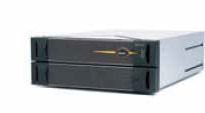

| ftServer System Specifications Processors | 2920 | 4920 | 6910 | 6920 |
| Processor(s) | 1 x Intel® Xeon® Silver 4210R processor 2.4 Ghz | 2 x Intel® Xeon® Silver 4210R processor 2.4 Ghz | 2 x Intel® Xeon® Gold 5220 processor 2.2 GHz |
2 x Intel® Xeon® Gold 6241C processor 2.3 GHz |
| Intel® Hyper-threaded Cores | 10 per processor (10 per CRU) | 10 per processor (20 per CRU) | 18 per processor (36 per CRU) | 22 per processor (44 per CRU) |
| Threads | 20 per processor (20 per CRU) | 20 per processor (40 per CRU) | 36 per processor (72 per CRU) | 44 per processor (88 per CRU) |
| Intel UPI speed | 9.6 GT/s | 9.6 GT/s | 10.4 GT/s | 10.4 GT/s |
| Maximum memory bandwidth | 76.8 GB/s | 192 GB/s | 213.3 GB/s | 213.3 GB/s |
| Memory | ||||
| Min/max memory | 32 GB / 256 GB DDR4 | 64 GB / 640 GB DDR4 | 64 GB / 1280 GB DDR4 | 64 GB / 1280 GB DDR4 |
| DIMM slots | 16 (8 per CRU) | 40 (20 per CRU) | 40 (20 per CRU) | 40 (20 per CRU) |
| I/O Subsystem | ||||
| Integrated PCIe® adapter slots | 4 PCIe 3 x8 (2 per CRU) |
4 PCIe 3 x8 (2 per CRU) |
4 PCIe 3 x8 (2 per CRU) |
4 PCIe 3 x8 (2 per CRU) |
| Additional PCIe adapter slots | N/A | 4 PCIe 3 x8 (optional) (2 per CRU) |
4 PCIe 3 x8 (included) (2 per CRU) |
4 PCIe 3 x8 (included) (2 per CRU) |
| Storage Subsystem | ||||
| Internal system drive bays | 12 Gb SAS (8 per CRU) OR 12 Gb SAS (2 per CRU), NVMe PCIe Gen4 x 4 U.2 (4 per CRU) |
12 Gb SAS (8 per CRU) OR 12 Gb SAS (2 per CRU), NVMe PCIe Gen4 x 4 U.2 (4 per CRU) |
12 Gb SAS (8 per CRU) OR 12 Gb SAS (2 per CRU), NVMe PCIe Gen4 x 4 U.2 (4 per CRU) |
12 Gb SAS (8 per CRU) OR 12 Gb SAS (2 per CRU), NVMe PCIe Gen4 x 4 U.2 (4 per CRU) |
| Internal 2.5″ drives | ||||
| ftScalable Storage Subsystem | ||||
| Expansion drive slots (RAID) | Up to 144 | Up to 144 | Up to 144 | Up to 144 |
| RAID levels | 1, 5, 6, 10 | 1, 5, 6, 10 | 1, 5, 6, 10 | 1, 5, 6, 10 |
| Drive types | ||||
| Embedded I/O | ||||
| 10/100/1000 Ethernet ports | 4 (2 per CRU) | 4 (2 per CRU) | 4 (2 per CRU) | 4 (2 per CRU) |
| 10 Gb Ethernet ports | N/A | 4 (2 per CRU) | 4 (2 per CRU) | 4 (2 per CRU) |
| 10/100 Management Ethernet ports | 2 (1 per CRU) | 2 (1 per CRU) | 2 (1 per CRU) | 2 (1 per CRU) |
| Serial (com) ports | 2 (9-pin) ports per system | 2 (9-pin) ports per system | 2 (9-pin) ports per system | 2 (9-pin) ports per system |
| USB ports | 4 USB 2.0 (redundant), 4 USB 3.0 (non-redundant) |
4 USB 2.0 (redundant), 4 USB 3.0 (non-redundant) |
4 USB 2.0 (redundant), 4 USB 3.0 (non-redundant) |
4 USB 2.0 (redundant), 4 USB 3.0 (non-redundant) |
| Manageability | ||||
| Baseboard management controller | Standard | Standard | Standard | Standard |
| Virtual Technician Module (VTM) | Standard | Standard | Standard | Standard |
| Graphics adapter | 1 VGA port per system | 1 VGA port per system | 1 VGA port per system | 1 VGA port per system |
Features of Stratus ftServer
Using ftServer, organizations are able to rapidly modernize IT infrastructure to maximize reliability, simplify manageability, and increase efficiency with minimal risk. Several key features help make ftServer easy to deploy, easy to manage, and easy to service—at the enterprise data center, control room, or edge location:
- Automated Uptime Layer
Stratus’ Automated Uptime Layer (AUL) software coordinates processor synchronization, data replication, and logic needed to ensure continuous availability, even in the event of a hardware component failure. AUL monitors nearly 500 alarm points to alert users of potential issues.
- Redundant hardware CRUs
Each ftServer platform consists of two identical customer replaceable units (CRUs)—each with their own processors, memory, storage and power. All redundant components and subsystems are packaged as a single system. This approach is completely transparent to applications, therefore requiring no development overhead to deploy, greatly simplifying management, and allowing the platform to be serviced and maintained while in operation, without disruption or downtime.
- Serviceable by OT and IT teams
ftServer is designed for serviceability. The CRUs are hot swappable without requiring platform shutdown or use of special tools. When a CRU is replaced, the system automatically re-synchronizes data, making ftServer ideal for deployment in remote manufacturing locations or locations with limited IT resources.
- Proactive health monitoring
ftServer delivers automated self-monitoring, alerting, self-diagnosing, and remediation capabilities. Platform health information sent via the Stratus ActiveService™ Network (ASN) or through an organization’s existing monitoring methods alerts users of potential issues before they occur.
- Industry standard components
ftServer uses the same chipsets, DIMMs, and drives, as those found in other industry standard x86 systems. It also uses standard shrink-wrapped operating system and virtualization software for ease of management and faster time to value.
- Workload consolidation
ftServer offers the flexibility to run critical applications on bare metal – with the choice of industry-standard operating systems from Microsoft or RedHat – or to consolidate workloads with the hypervisor of your choice – whether VMware vSphere, Microsoft Windows Server with Hyper-V, or Red Hat Enterprise Linux with KVM.
Key Benefits of Stratus ftServer
- Eliminate application downtime: Built-in fault tolerance delivers greater than five nines availability to run critical applications.
- Avoid data loss and ensure data integrity: Redundant computing architecture protects in-flight data in the event of component failure.
- Simplify management and support: Pro-active health monitoring and self-healing saves time and enables management by OT or IT.
- Rapidly modernize computing infrastructure: Deploy virtualization to consolidate multiple software workloads onto a single platform and run advanced software.
- Reduce TCO: Platform delivers 7-10 year lifespan, twice that of traditional servers, reduces IT footprint, and requires fewer software licenses.
Use cases for Stratus ftServer
Versatility and Reliability of ftServer for Critical Applications Across Industries
Process
- Oil & Gas
- Chemicals
- Metals & Mining
- Pulp & Paper
Hybrid
- Pharma Manufacturing
- Life Sciences
- Food & Beverage
- Specialty Chemicals
Discrete
- Semiconductor
- Electronics
- Automotive
- Marine
Infrastructure
- Renewables & Power Gen
- Water & Wastewater
- Transportation
- Smart Buildings & Smart City
B2B/B2C
- Financial Services
- Retail/eCommerce
- Telecommunications
- ePayment / Mobile Banking
About Stratus
For more than 40 years, Stratus has provided high-availability, fault-tolerant computing to Fortune 500 companies and small-to-medium sized businesses enabling them to securely and remotely run mission-critical applications without downtime at the data center and Edge, and turn that data into actionable intelligence.
With Stratus, you can rest assured your essential business applications will be online, all the time. Our proactive ftServiceSM offerings focus on preventing downtime and data loss — an advantage that far outweighs the “break-fix” support offered by other vendors.
Servo Dynamics – Master Distributors of Stratus Technologies in Viet Nam
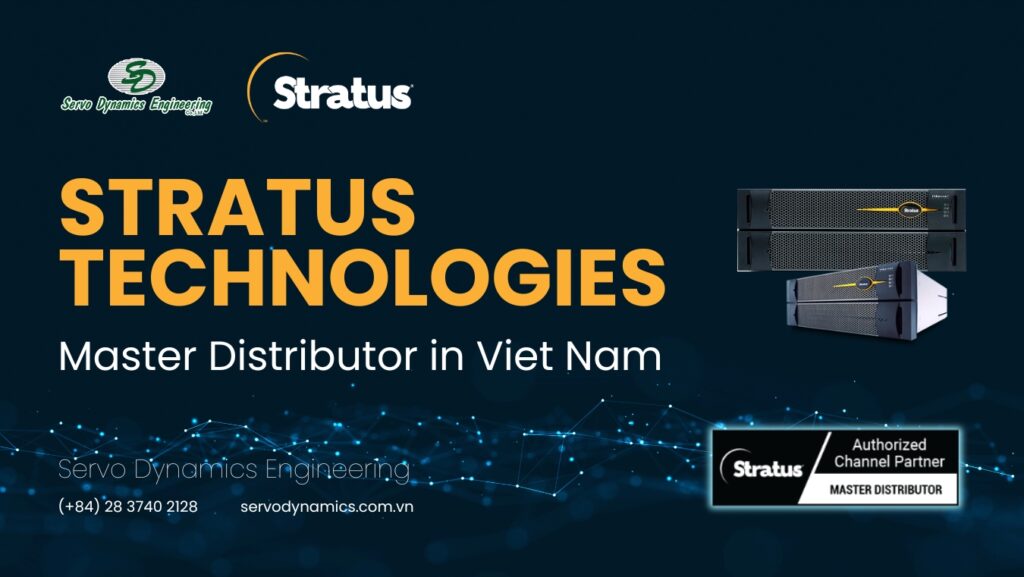
As the master distributor of Stratus Technologies in Vietnam, Servo Dynamics brings the world-class reliability of Stratus ftServer and other fault-tolerant systems to local businesses. With extensive experience and technical expertise, Servo ensures that Vietnamese companies can access the latest Stratus technologies to improve their IT infrastructure, optimize operations, and minimize downtime.
| Learn more: Stratus Vietnam – Servo Dynamics Engineering As Authorized Distributor |
Servo Services for Stratus ftServer
Servo Dynamics offers a variety of certified options to easily extend your continuously available platform. From value added managed support plans, to modular storage—get the additional capabilities that you need, to satisfy your unique enterprise and Edge Computing requirements.
ftServices
A variety of managed support plans and professional services are available to ensure your systems are up to date and operating at peak efficiency. You’ll get the help you need, when you need it. Total Assurance, System Assurance, Extended Platform Support, and Platform Support managed plans are available for different applications, environments, and use cases.

ftScalable
Specifically designed to complement ftServer, this hybrid storage array helps you easily meet your growing storage needs, while also ensuring continuous availability and data integrity. Manage both hot and cold storage with real time data tiering, and protect your sensitive data at rest with encrypted disk technology.

Request a Quote
Download Free Resources

 Tiếng Việt
Tiếng Việt
